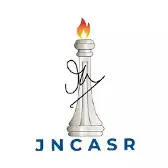z

University Grants Commission (UGC)
2002
Co-Ed
Deemed
27.35 Acres
Aspirants applying for any course are required to follow the JNCASR admission procedures mentioned below. The fees structure for the JNCASR courses are as below:
| Courses | Fees |
|---|---|
| M.Sc | Rs. 5,000 |
| Ph.D | Rs. 50,000 |
| Integrated Ph.D | Rs. 60,000 |
1. The candidates applying for any JNCASR Courses are required to fill the application form on the official website with the required credentials and details.
2. The process for the JNCASR admission commences in March every year.
Jawaharlal Nehru Centre for Advanced Scientific Research, Bangalore is a multidisciplinary research institute. The university was established in 1989 by the Department of Science and Technology of the Government of India.
The research institute is located in Jakkur, Bangalore. JNCASR, Bangalore is an autonomous institute and a centre recognized as a Deemed-to-be-University by the University Grants Commission (UGC) in 2002. Jawaharlal Nehru Centre for Advanced Scientific Research, Bangalore was founded by the Bharat Ratna awardee Professor C.N.R. Rao.
Jawaharlal Nehru Centre for Advanced Scientific Research, Bangalore is headed by a President and is Assisted by the Administrative Officer who is in charge of their respective departments. JNCASR, Bangalore missions to undertake and encourage aspirants of Science and Engineering for world-class scientific research and training.
It offers various courses under PG Diploma, MS (Research), Ph.D, and Integrated Ph.D programs in the science field. Various courses provided by the institute are awarded by the Jawaharlal Nehru University (JNU), New Delhi.
Students at Jawaharlal Nehru Centre for Advanced Scientific Research, Bangalore get an intellectual atmosphere and an opportunity to interact with scientists from famous research institutes around the world.
The JNCASR campus at Jakkur, Bengaluru was gifted by the Government of Karnataka and was inaugurated in 1995. Initially, the main campus was built on a 15.55-acre plot that later expanded across 27.35 Acres. The Jakkur campus offers a peaceful environment for researchers in both Experimental/ Theoretical Work. The campus houses state of art infrastructural facilities for the candidates along with a dining hall, health centre, and daycare centre.
The Sahyadri campus is a 1.2 acres campus that houses apartments for Post-Doctoral researchers, Hostel, and residence for visiting students, etc.
JNCASR also has a 10-acre campus that is located at Chokkanahalli, Bengaluru. This campus is around 5 km away from the present campus and is also called the Chamundi campus. The Chamundi campus is the academic campus of the Centre.
The Arkavati Campus is located at Shivanapura, Bengaluru. It is a 1-acre site that is adjacent to the Centre for Nano and Soft Matter (CeNS) campus. A state-of-the-art innovation centre is coming up on the campus.
JNCASR, Bangalore hostel offers room accommodations and residential facilities for married candidates. The hostel facilities offered by the university have twin-sharing bathrooms, washing machines, Wi-Fi, Gym, Guest Rooms, etc.
Jawaharlal Nehru Centre for Advanced Scientific Research, Bangalore has 4 hostel accommodation facilities:
1. Jawahar Student’s Hostel (IISc Campus): The Jawahar Students Hostel is located at the IISc Gymkhana Campus that has 15 rooms meant for the visiting students. The hostel room is chargeable for the Centre Students. It charges around Rs 100 for a day per person.
2. Student Residence
3. Visiting Student’s Hostel (Sahyadri Campus)
4. Post-Doctoral Accommodation
The JNCASR Hostel also accommodates a gym that has two wings:
Jawaharlal Nehru Centre for Advanced Scientific Research, Bangalore’s computer lab is responsible for the maintenance of computers and network facilities along with the storage management at the institute. The lab provides support for both Windows and Linux based machines used by the institute’s candidates and the faculty members.
To support the staff members of the institute, JNCASR has an independent daycare facility with a spacious area to play on the campus. The facility is open for children between the age group of 1 and 10. The JNCASR daycare ensures to take care of the children of the staff members.
The daycare facility organizes regular meetings with the parents to facilitate a smooth operation to provide top quality facilities. Children at the facility are provided toys, books, and many other things to keep them occupied. The facility has CCTV cameras to assist the staff to keep an eye on each child.
Dhanvantri is the Primary Health Care that provides service to the staff members, staff families, students, and retired members of the Jawaharlal Nehru Centre for Advanced Scientific Research, Bangalore. The JNCASR health care facility is located near its residential area.
Dhanvantri has 3 experienced doctors along with 4 nurses for assistance. The health centre provides outpatient care, provides limited in-patient treatments, and undertakes several clinical investigations. All the minor ailments are treated at the Health Centre. The centre also has a Physiotherapy unit presided by qualified Physiotherapists.
JNCASR Dining Hall serves healthy and hygienic vegetarian dishes during breakfast and lunch for university members and visitors. The menu of the dining hall ensures the preparation of traditional dishes for the JNCASR Community.
Apart from the dining services, the JNCASR Dining hall also has refreshment points such as Espresso Coffee point and Snack’s point that ensure service during the working hours.
The JNCASR library is well-stocked, with around 9,662 books in its collection and also has access to over 4,000 scientific journals. The library offers services such as document delivery, interlibrary loan, and bibliometric studies.
In 2019-20 around 95 books were newly added along with 167 new subscriptions to the journals. 77 new patents also became part of the library, increasing the total to 699 patents.
Jawaharlal Nehru Centre for Advanced Scientific Research institute believes that health is of paramount importance. The centre has set up a gymnasium that has facilities with modern equipment and gears for both students and residential staff members.
The main aim is to provide the members with facilities that can aid in overcoming stress related to work, anxiety, lifestyle diseases etc. The gym is located at the student residence. It also has a gym instructor who assists the students to carry out fitness in a proper manner. One gym is also located in the residential area for the staff members. The gym facilitates Treadmill, Elliptical Cross Trainer, 4 station Multigym, and dumbbells of 1 kg, 2.5 kg and 5 kg.
| Faculty/ Women's Lounge | Workshop |
| Safety | Auditorium |
| Conference Hall | Kanada Auditorium |
| Lecture Hall | Guest House |
| Animal House | Confocal Microscope |
| Bio-Imaging Facility | NSM |
| Flow Cytometry | TITAN Transmission Electron Microscope |
| Scanning Electron Microscope/Transmission Electron Microscope | Sophisticated Analytical Instrument Facility |
1. JNCASR Ranking has been number 4 among the top universities and 11 for the overall category in 2017 by NIRF.
2. The Nature Index 2020 has ranked JNCASR, Bangalore:
3. Scimago Institutions Ranking 2020 has ranked JNCASR:
4. Both in the year 2017 and 2018, JNCASR has received the Clarivate Analytics India Innovation Award.
| University
Address |
JNCASR, Jakkur, Bengaluru, Karnataka, India - 560064
|
| Campus Size |
27.35 Acres |
| Establishment Year |
2002 |
| Management |
Department of Science and Technology, Government of India (GoI) |
| Ownership |
Deemed |
| Approval/
Recognition |
University Grants Commission (UGC) |
| Exam |
JNCASR Written Test/ JAM/ GATE/ JEST/ CSIR-NET/ ICMR, etc |
null
Candidates applying for the course at JNCASR, Bangalore must have pursued a Bachelor’s degree in any branch of Science with Chemistry as a major subject. The applicants must have scored a minimum of 55% aggregate marks. Candidates who have qualified for the Joint Admissions Test for Masters (JAM) can also apply for the program.
| Courses | Fees |
|---|---|
| M.Sc (Chemistry) | Rs. 5,000 |
Swipe
Aspirants for the Integrated Ph.D Program for Material Science at Jawaharlal Nehru Centre for Advanced Scientific Research, Bangalore must have completed their Bachelor’s degree in any Science branch with 55% of minimum aggregate marks. The candidates must have pursued Physics, Chemistry, and Mathematics as mandatory subjects. JAM 2021 qualified candidates are also eligible to apply for the program.
JNACSR, Bangalore applying candidates must have completed a Bachelor's degree from any Science branch with Chemistry or Mathematics as a mandatory subject. The candidates must have scored a minimum of 55% aggregate marks. JAM 2021 qualified candidates are also eligible to apply for the program.
Jawaharlal Nehru Centre for Advanced Scientific Research, Bangalore applying students must have scored a minimum of 55% aggregate marks in Bachelor’s or equivalent degree with Physics, Chemical, or Biological Science (including Biotechnology, Pharmaceutical, Veterinary Sciences and Agricultural Sciences) as a mandatory subject.
The candidates who have completed B.E/ B. Tech degree or equivalent degree can also apply for the program. The JAM 2021 qualified candidates are also encouraged to apply for the program.
| Courses | Total Fees |
|---|---|
| Material Science/ Chemical Science/ Biological Science | Rs. 60,000 |
Swipe
JNACSR, Bangalore offers the following research programs:
JNACSR, Bangalore applying candidates must have completed either M.Sc, BE/ B.Tech, ME/ M.Tech, B.VSc/ M.VSc or MBBS/ MD to qualify for the respective research programs. The candidates must have scored at least 50% aggregate marks in the highest university examination.
Along with that, they should have qualified national exams such as GATE/ JEST/ GPAT/ UGC / CSIR-NET-JRF/ ICMR-JRF/ DBT-JRF/ INSPIRE-JRF. ME/ M.Tech or equivalent degree holders are required to qualify in one of the national exams as mentioned. JNCASR, Bangalore will also consider exceptional candidates without these exams to apply.
| Chemistry and Physics of Materials Unit | Engineering Mechanics Unit |
| New Chemistry Unit | Theoretical Sciences Unit |
| Evolutionary and Integrative Biology Unit | Neuroscience Unit |
| Molecular Biology and Genetics Unit | - |
Swipe
| Courses | Total Fees |
|---|---|
| Ph.D | Rs. 50,000 |
| MS (Engg)/ MS (Research) | Rs. 35,000 |
Swipe
null
Registrations for the JNCASR admission process begins in March every year. The candidates are required to fill the application form with the necessary credentials and details. JNCASR admissions for all Masters, Ph.D, and Research programs are funded by the Department of Science and Technology, Government of India.
1. Fill the online application form on the official JNCASR Deemed-to-be-University website.
2. Provide the required information and upload the self-attested documents.
3. Candidates must mention the correct application number, name, along with the desired program.
4. After the submission, a printout of the application form has to be sent to the academic coordinator via post.
5. The application form is required to be attested along with a DD amount of Rs. 200
6. Applicants are advised to keep a copy of the application form and DD for future requirements and reference.
Candidates applying for Integrated Ph.D programs are required to take the JNCASR written test conducted that is followed by the interview at Jawaharlal Nehru Centre for Advanced Scientific Research, Bangalore. Admission for all other programs is based on merit.
1. Visit the official JNCASR website
2. Click on the ‘Admit Card’ tab
3. Select for the applied program
4. Enter the JNCASR login credentials
5. The admit card will appear for download
The Jawaharlal Nehru Centre for Advanced Scientific Research in association with the Department of Science and Technology, invites applications for JNCASR scholarships to the meritorious candidates:
1. Scholarships or Fellowships will not be paid for by the candidates for their M.Sc.
2. For integrated Ph.D programs the candidates are paid a fellowship of Rs.19,000 for the first and second year, whereas Rs.31,000 is paid during the third and fourth year, and Rs.35,000 during the Fifth, Sixth, and Seventh year
3. Ph.D students will receive Junior Research Fellowship/ Senior Research Fellowship of Rs. 31,000 per month for the first 2 years and Rs. 35,000 per month for the remaining 3 years.
4. The MS (Research)/ MS (Engineering) candidates will receive a scholarship amount of Rs. 31,000 per month.



